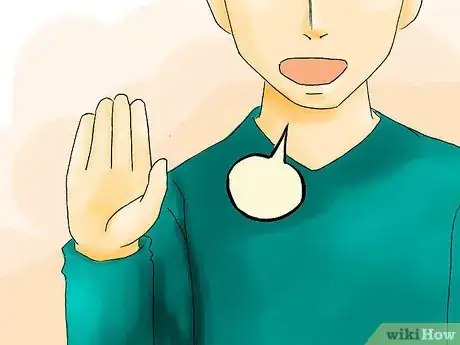This article was co-authored by Nicolette Tura, MA. Nicolette Tura is an Authentic Living Expert who operated her own wellness business for more than ten years in the San Francisco Bay Area. Nicolette is a 500-hour Registered Yoga Teacher with a Psychology & Mindfulness Major, a National Academy of Sports Medicine (NASM) certified Corrective Exercise Specialist, and is an expert in authentic living. She holds a BA in Sociology from the University of California, Berkeley and got her master's degree in Sociology from SJSU. She constantly draws from her own wounds and challenges; with her training in the healing arts and sociology, she offers potent content, powerful meditations, and game-changing seminars on inspiring elevation on a personal and corporate level.
There are 9 references cited in this article, which can be found at the bottom of the page.
This article has been viewed 40,670 times.
Having strong friendships can influence your life positively in many aspects. Whereas acquaintances are just casual friends, people with strong friendships can rely on each other and confide in each other to a much greater degree. Strong friendships take time and effort to create, but with a little hard work and effort you can be well on your way to building some strong friendships.
Steps
Making Friends
-
1Make some friends. Meeting new people can be difficult, but you just have put yourself out there and be your charming self. This involves being brave and approaching new people and maybe even stepping outside of your comfort zone a little bit.[1]
- Ask one of your classmates to help you with a particularly difficult math question.
- Ask someone in your last period class if they can give you a ride home from school.
- Stay persistent when you're trying to make friends. It might take weeks of saying hi and striking up conversations before you start becoming friends.
-
2Get to know them. When you make a new friend, take some time to learn things about them – at least the basics. Learn their name, ask about their family, and find out where they live. If they go to the same school as you, find out what classes they’re taking.[2]
- Figure out their basic interests, activities they enjoy, and who their current friends are.
- That way you can bond over shared interests.
- Try asking something like, “What do you like to do in your free time?”
- You can also ask, “What do you usually do when you get home from school?”
- Try seeing if they share one of your hobbies by saying something like, “I love playing video games – do you play any?”
Advertisement -
3Spend time with them. Introduce them to some friends of your own, so everyone will get along just fine. Make plans to go do some activities together. This is how people form bonds – by sharing experiences together. The more memories you create together, the stronger your friendship will become. This takes time, but it’s worth it.[3]
- Sit with them at lunch, walk to class together, or try to meet up before or after school.
- Invite them to an outing you're going to with your existing friends.
- An outing is even better than hanging out at school because there are no classes to distract you.
Cultivating Existing Friendships
-
1Spend quality time with your friends. Friendships, especially new ones, can’t blossom without spending time together. The more time you share with your new friends, the more memories you’ll have and the stronger the bond will become.[4]
- Join the same activities at school to spend your free time together and share an experience.
- For example, if your new friend plays Ultimate Frisbee and you like to exercise outdoors, join the UF team as well.
- Invite your friends over for dinner or for a slumber party.
- Take a weekend trip together to see your favorite band play.
-
2Share your feelings.[5] One of the most important things about friendship is being open and sharing your feelings with your friend without fear of being judged or rejected. The more you share with another person, the better they’ll know you. And this will probably lead to them sharing more with you too.[6]
- If you’re upset about something, call your friend and share it with them.
- If you think your friend is upset about something, make yourself available for them to share it with you.
- Offer your help if possible, saying, "I see how complicated that situation is. Know that I'm here for you if you ever need to talk."
- Make sure that you listen to other people with acceptance and avoid judging them as well.
-
3Let your friends know you value them. Whenever you see your friend at school, acknowledge them happily. Say hello and give them a hug or a high-five. Don’t ignore them. Initiate a conversation and ask how they are doing. Even a quick "I'm so happy to see you!" can go a long way towards cultivating a strong friendship.[7]
- Smile when you see your friends so they know you are happy to see them.
Going the Extra Mile
-
1Celebrate special occasions. Make an effort to be present for the special milestones in your friends’ lives. Being there for big events is part of what we expect our friends to do. Making it a priority to show up for your friends shows them that you value them and you want to continue building the friendship.
- Show up to birthday parties, graduation parties, and any other celebration that might be happening in your friend’s life.
- If you can't make it for whatever reason, let your friend know ahead of time.
- Bring a little gift to school for your friend on their birthday to show that you care.
-
2Stay true to your word. A friend is someone you can count on no matter what. Someone who flakes out when it is convenient for them isn’t someone you can trust or count as a close friend. If you want to build strong friendships, make sure you don’t lie to your friend or break promises.[8]
- Being a reliable friend will help you build strong friendships more quickly than just about anything else.
-
3Be a good influence. People like to spend time with people they admire and respect. If you are constantly making poor decisions (like making bad grades, getting in trouble for skipping school, or doing things to get grounded by your own parents), you will likely not be able to build strong friendships with quality people. Try to make good choices and influence those around you in a positive way.[9]
- This will also help your friends’ parents to like you.
- Be diligent about getting your homework done and offer study with your friend if they seem to be having trouble in school.
-
4Reconcile with friends when problems arise. Friends fight sometimes and this is normal. However, it is also important to reconcile with your friends to maintain your friendships. If you get into a fight with a new or old friend, then make sure that you take steps to reconcile with them.
- To reconcile with someone, you will need to apologize, talk with your friend about what happened, and find ways to prevent a similar situation in the future.
Expert Q&A
-
QuestionHow can I meet new people at school?
 Nicolette Tura, MANicolette Tura is an Authentic Living Expert who operated her own wellness business for more than ten years in the San Francisco Bay Area. Nicolette is a 500-hour Registered Yoga Teacher with a Psychology & Mindfulness Major, a National Academy of Sports Medicine (NASM) certified Corrective Exercise Specialist, and is an expert in authentic living. She holds a BA in Sociology from the University of California, Berkeley and got her master's degree in Sociology from SJSU. She constantly draws from her own wounds and challenges; with her training in the healing arts and sociology, she offers potent content, powerful meditations, and game-changing seminars on inspiring elevation on a personal and corporate level.
Nicolette Tura, MANicolette Tura is an Authentic Living Expert who operated her own wellness business for more than ten years in the San Francisco Bay Area. Nicolette is a 500-hour Registered Yoga Teacher with a Psychology & Mindfulness Major, a National Academy of Sports Medicine (NASM) certified Corrective Exercise Specialist, and is an expert in authentic living. She holds a BA in Sociology from the University of California, Berkeley and got her master's degree in Sociology from SJSU. She constantly draws from her own wounds and challenges; with her training in the healing arts and sociology, she offers potent content, powerful meditations, and game-changing seminars on inspiring elevation on a personal and corporate level.
Authentic Living Expert To meet new people, join after school activities or be social in class by offering to answer questions and helping others when they don't understand the material you're learning. In the halls or during lunch, walk up and talk to strangers and try to find some common ground to build upon. If you already have a good friend, ask them to join you so you can both meet new people.
To meet new people, join after school activities or be social in class by offering to answer questions and helping others when they don't understand the material you're learning. In the halls or during lunch, walk up and talk to strangers and try to find some common ground to build upon. If you already have a good friend, ask them to join you so you can both meet new people. -
QuestionHow do I make sure that my friend isn't a backstabber?
 Community AnswerTry seeing how they can be trusted with small, insignificant pieces of information - things that you don't mind getting out. Extend your trust and be observant of how your friend treats you around the people they seem to really like.
Community AnswerTry seeing how they can be trusted with small, insignificant pieces of information - things that you don't mind getting out. Extend your trust and be observant of how your friend treats you around the people they seem to really like.
References
- ↑ http://www.succeedsocially.com/sociallife
- ↑ https://www.psychologytoday.com/blog/fulfillment-any-age/201504/10-great-ways-get-know-new-people-without-awkwardness
- ↑ https://www.theatlantic.com/health/archive/2014/10/the-importance-of-sharing-experiences/381493/
- ↑ http://www.newyorker.com/science/maria-konnikova/social-media-affect-math-dunbar-number-friendships
- ↑ Nicolette Tura, MA. Authentic Living Expert. Expert Interview. 23 January 2020.
- ↑ http://www.huffingtonpost.ca/marcia-sirota/how-to-talk-to-your-frien_b_974629.html
- ↑ https://blog.bufferapp.com/the-science-of-smiling-a-guide-to-humans-most-powerful-gesture
- ↑ https://www.psychologytoday.com/blog/lights-camera-happiness/201005/why-keeping-your-promise-is-good-you
- ↑ http://www.huffingtonpost.com/amy-morin/friends-health-science_b_7042042.html




































































